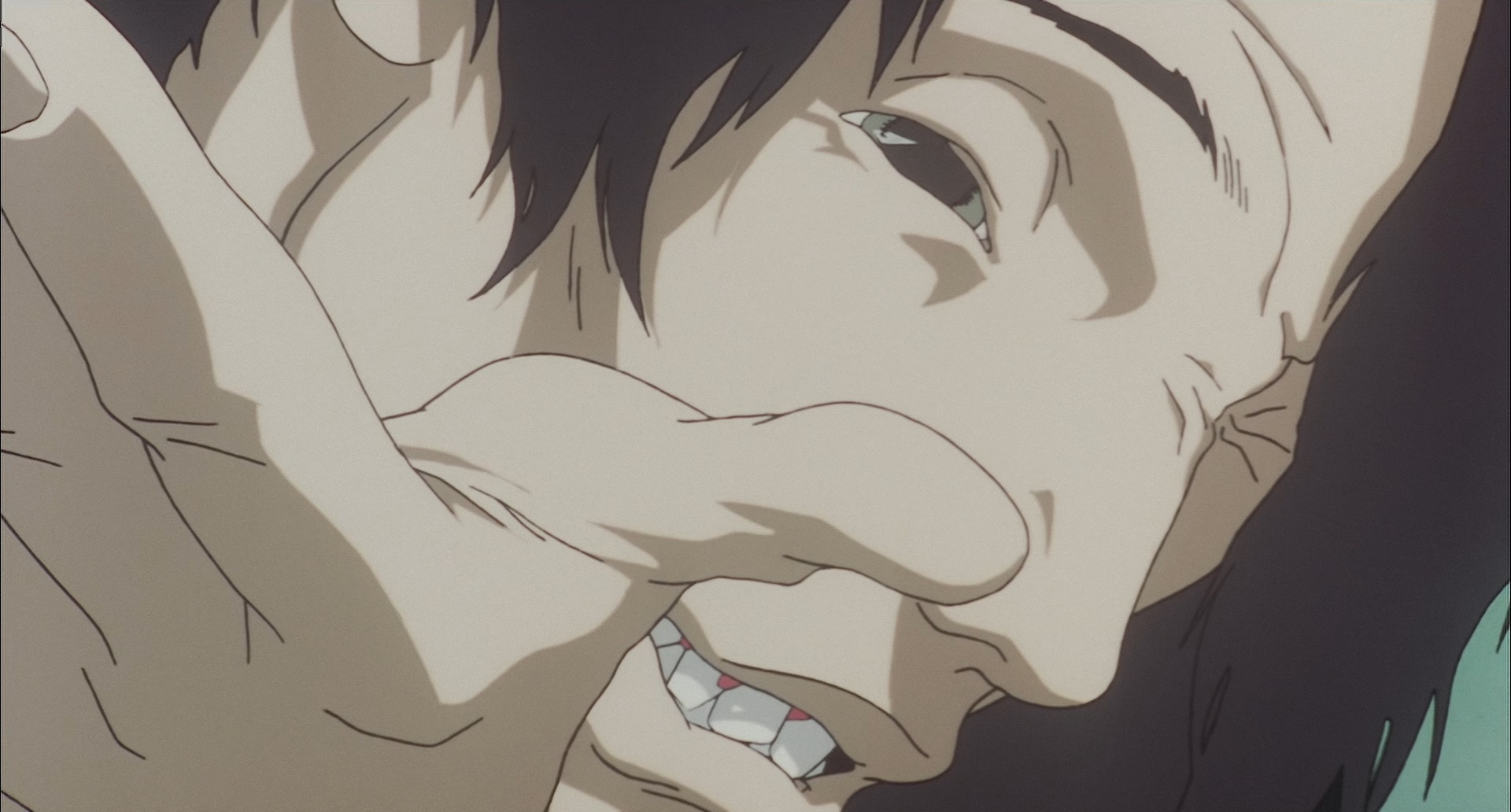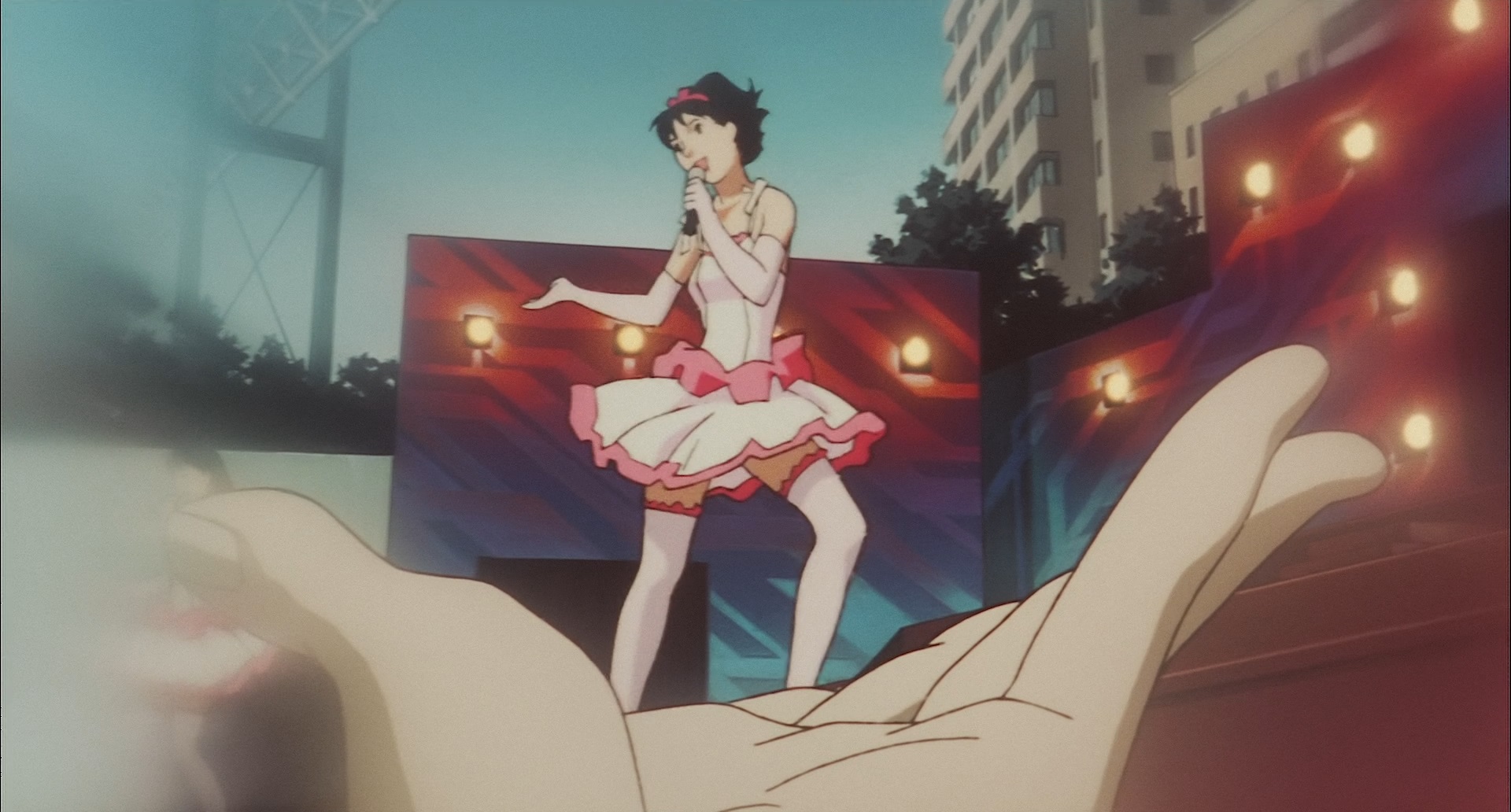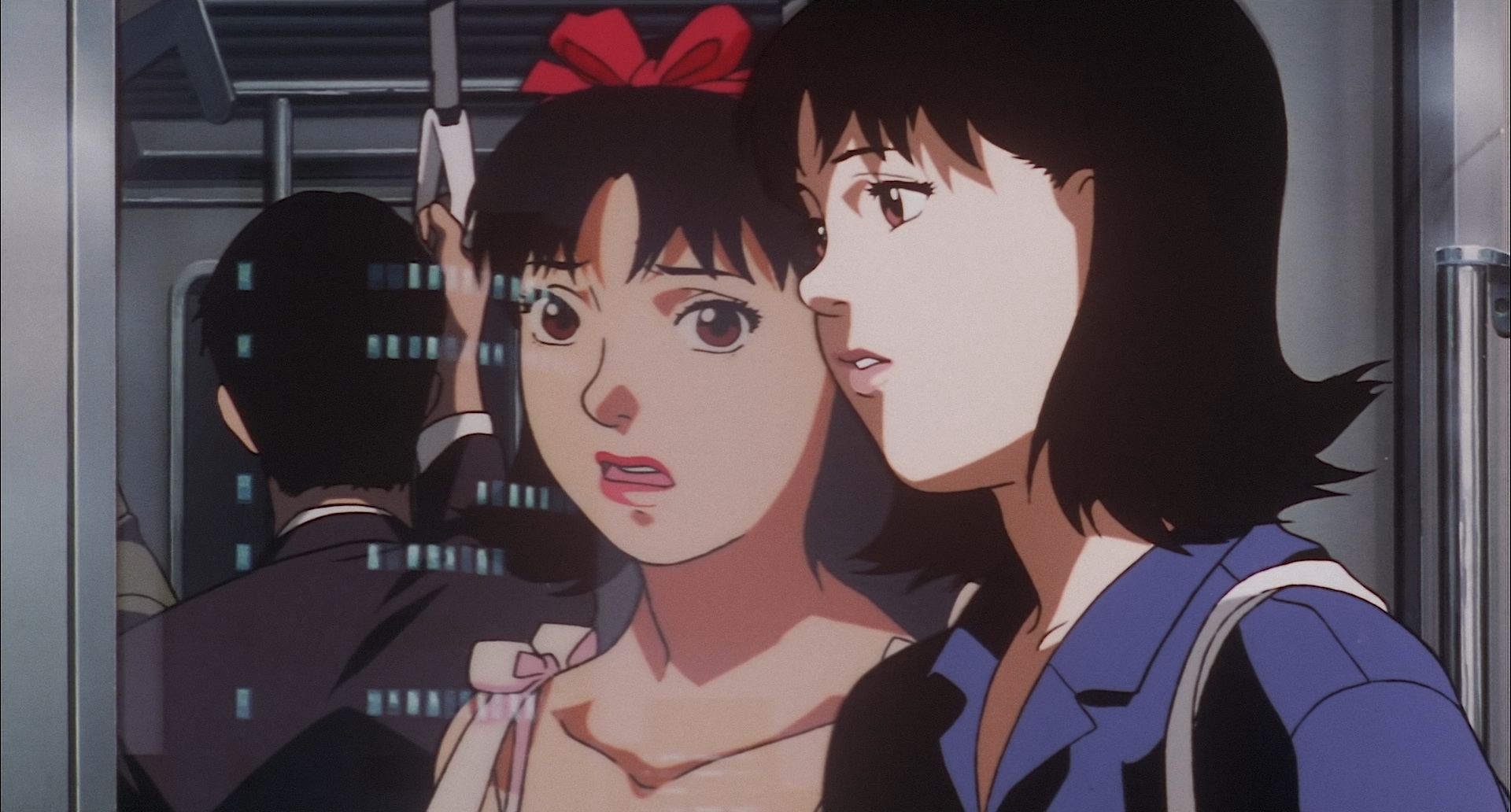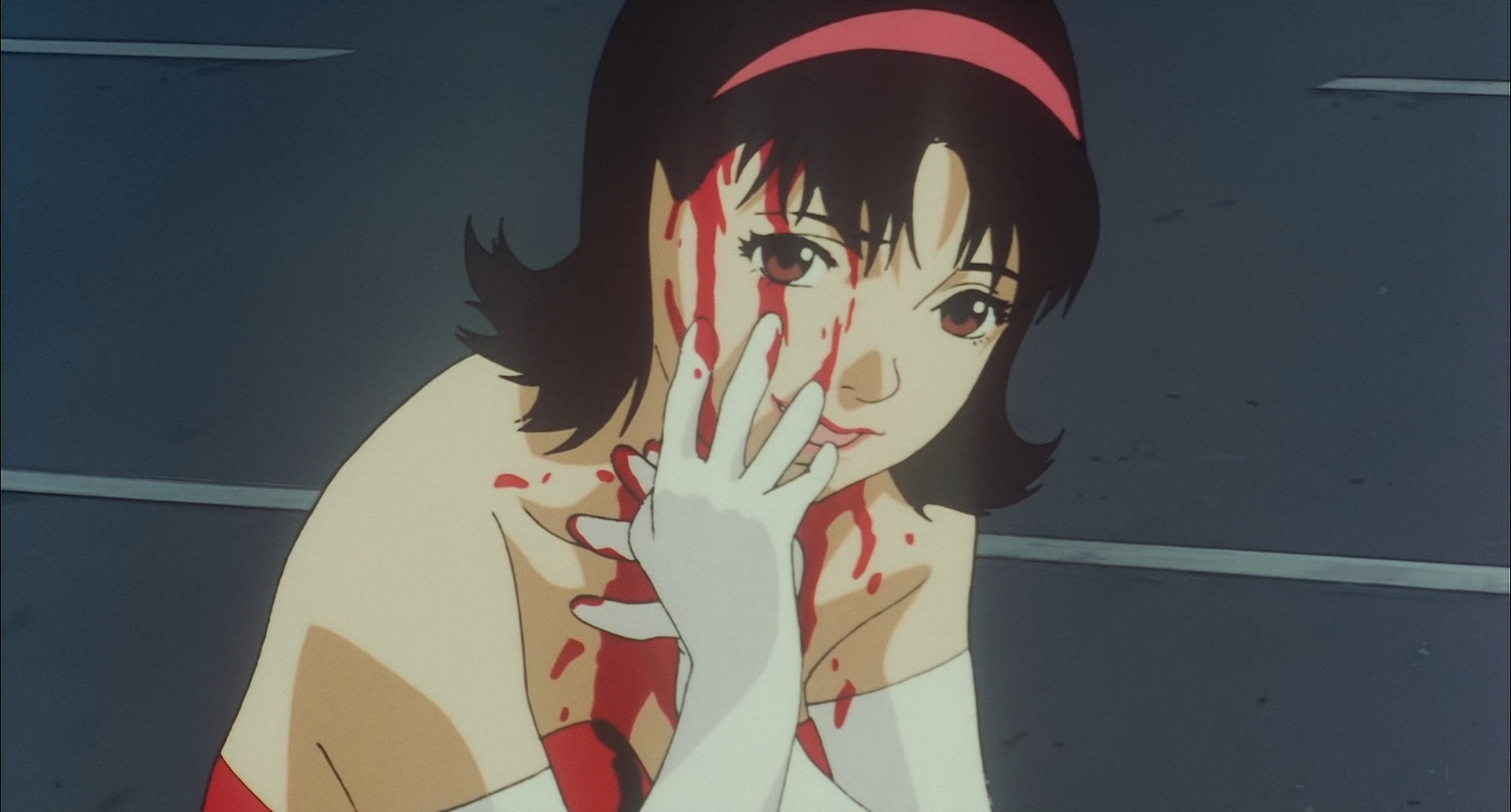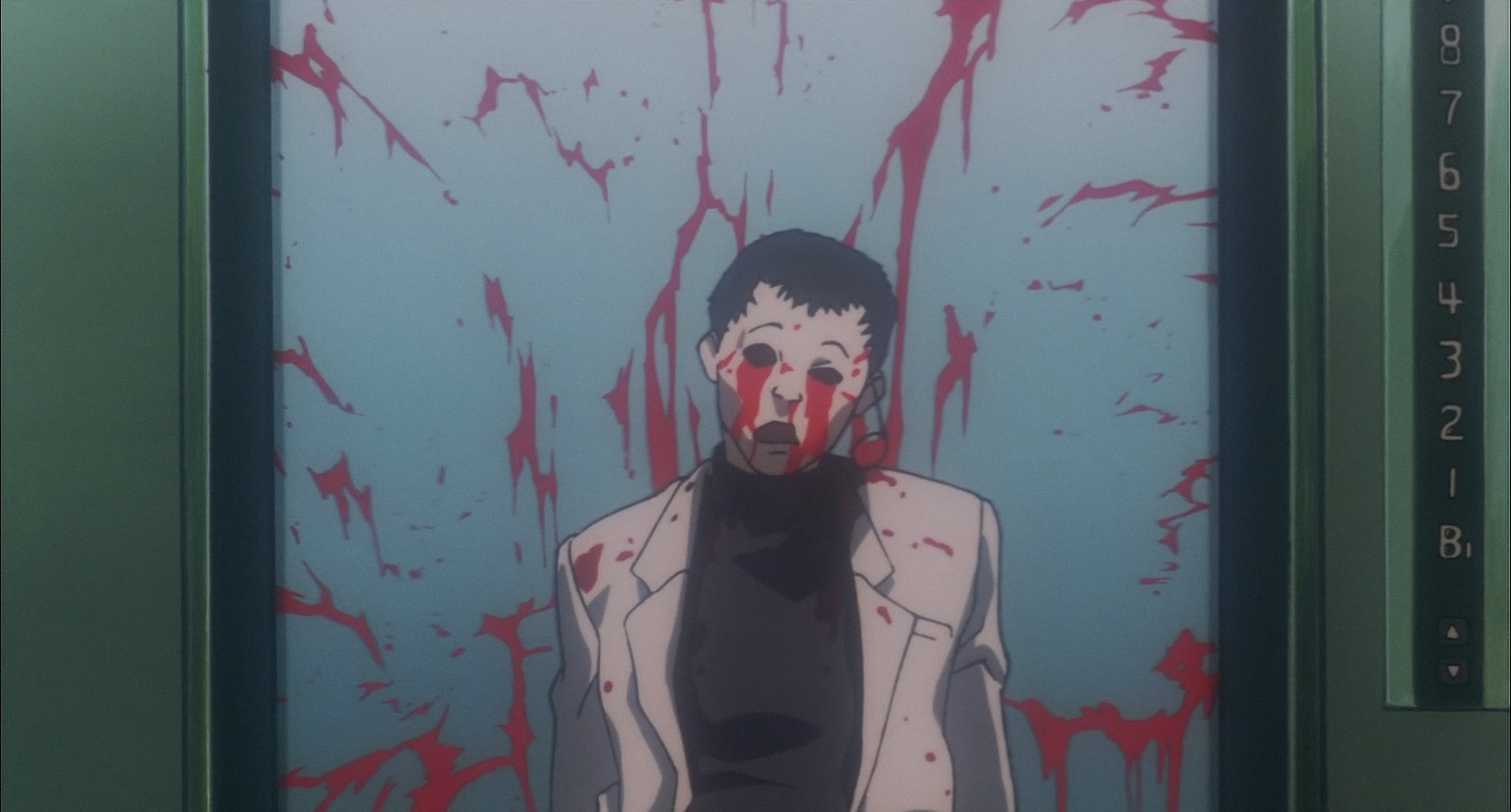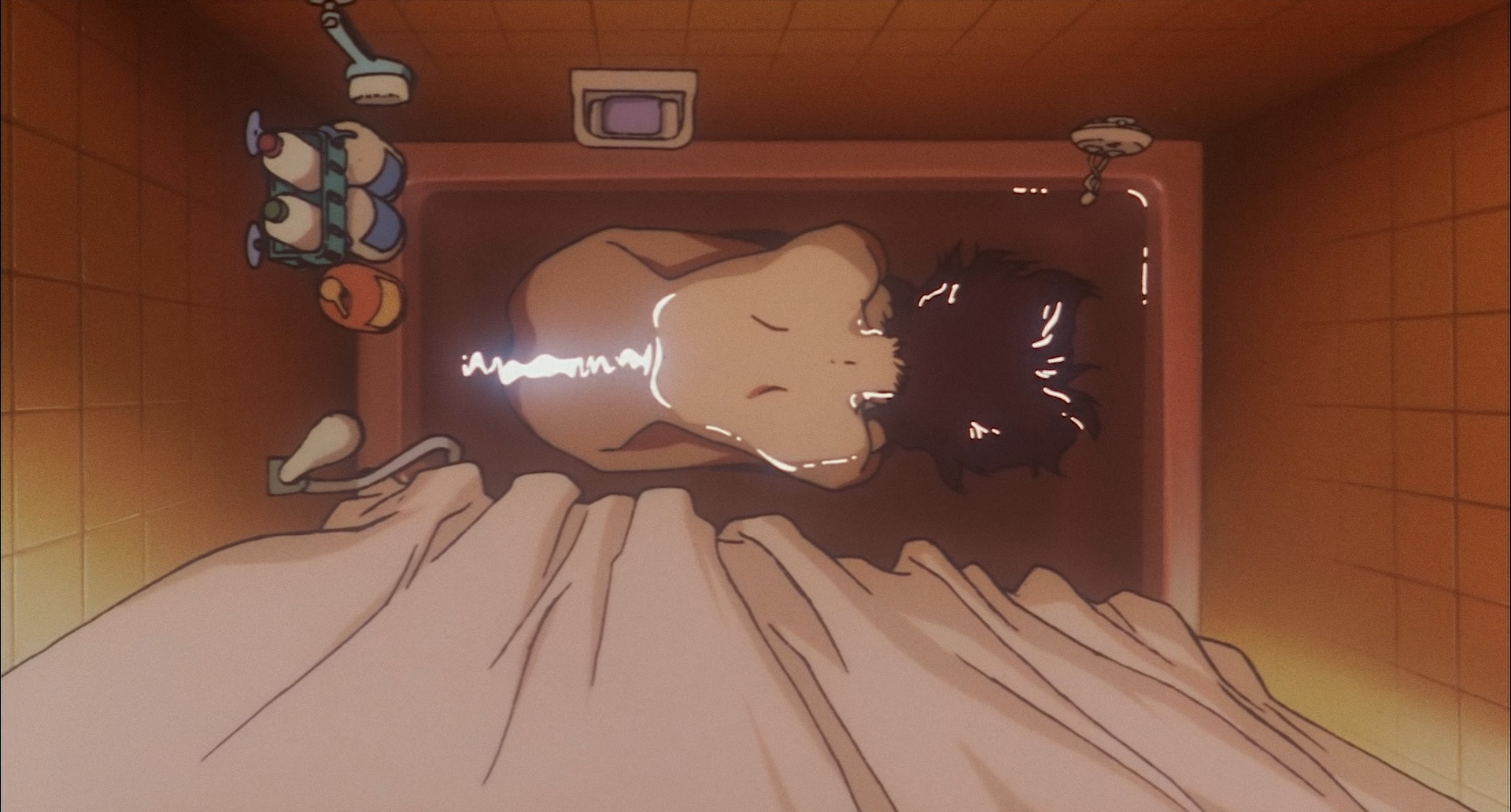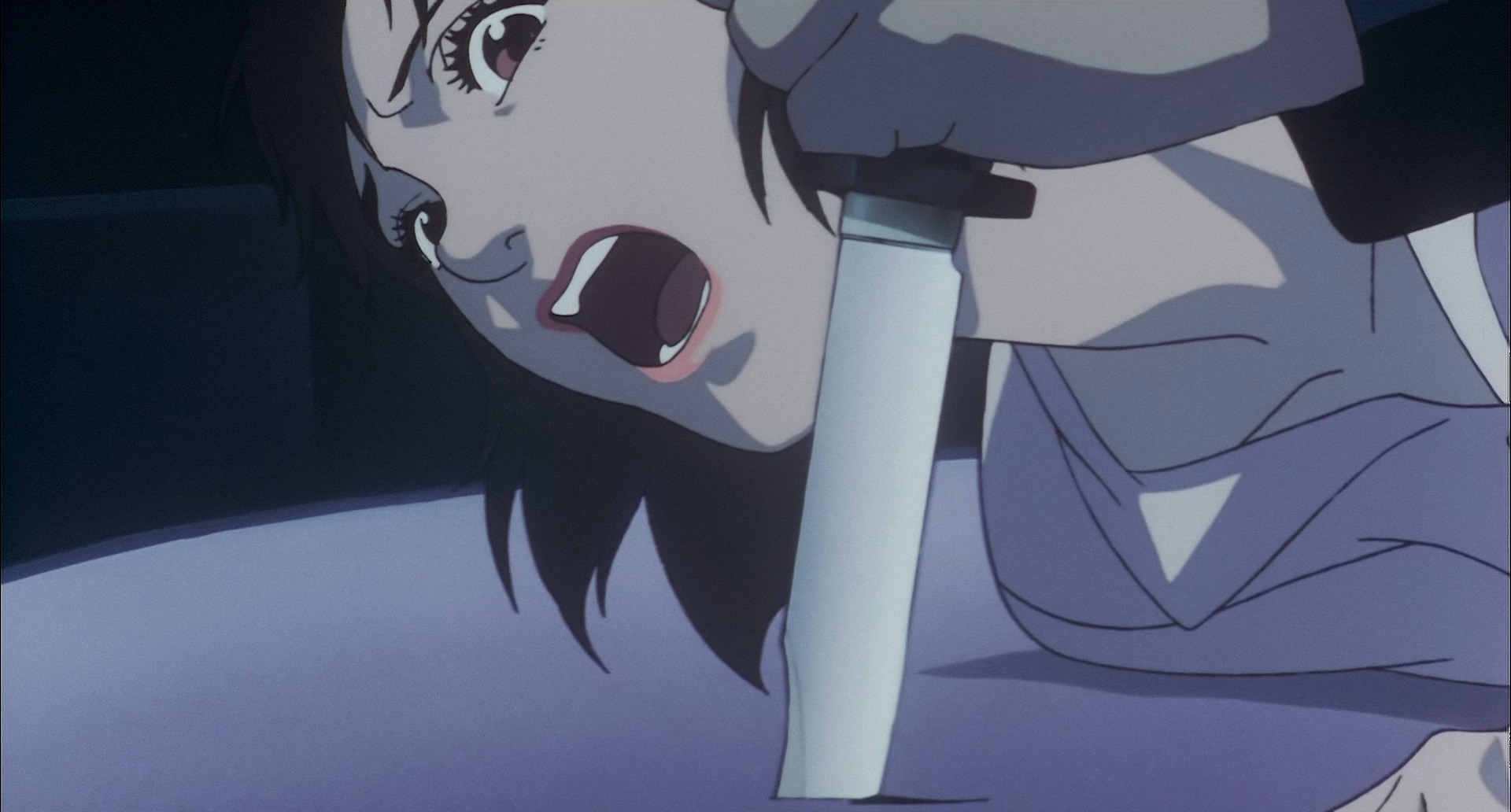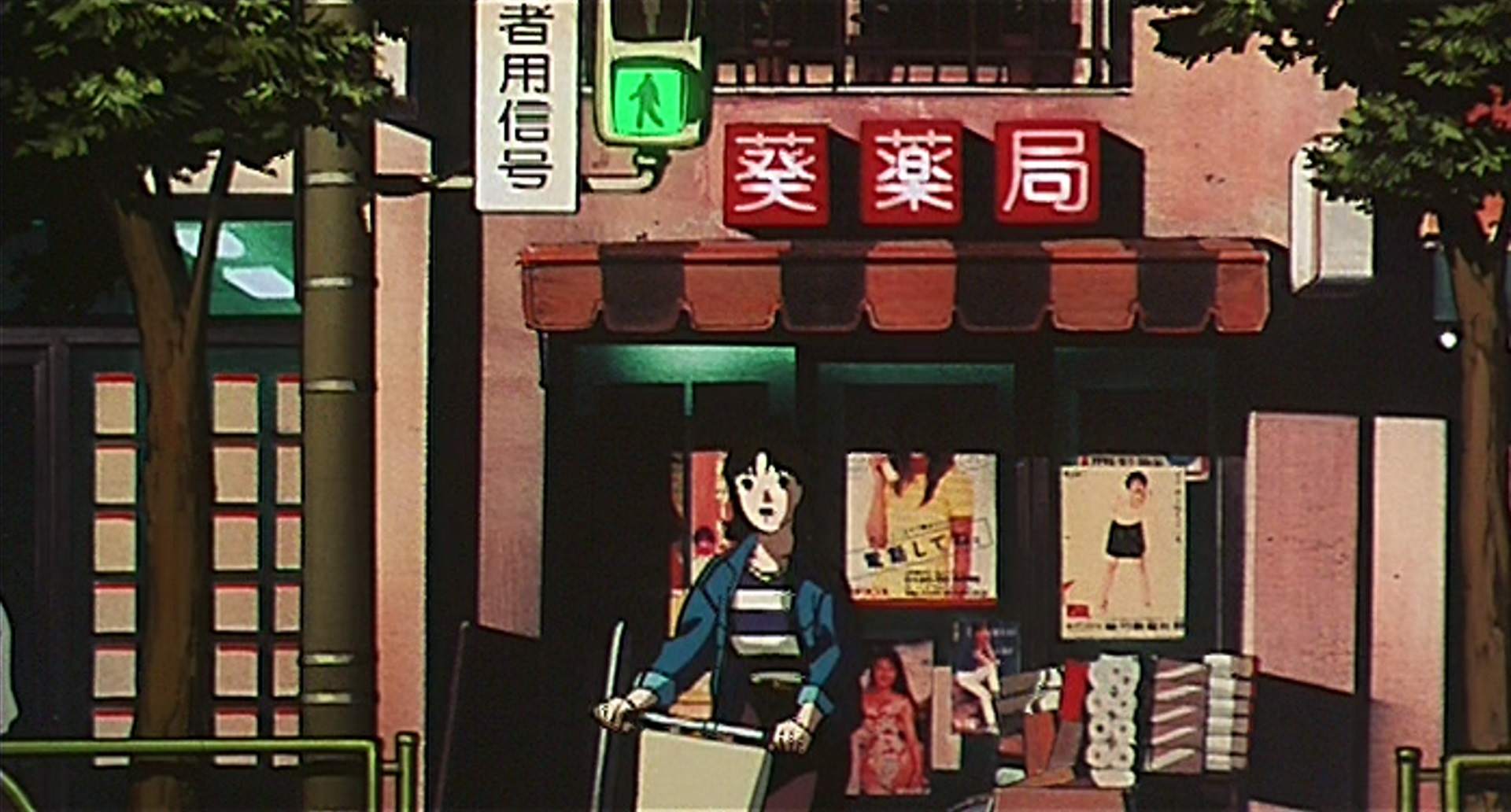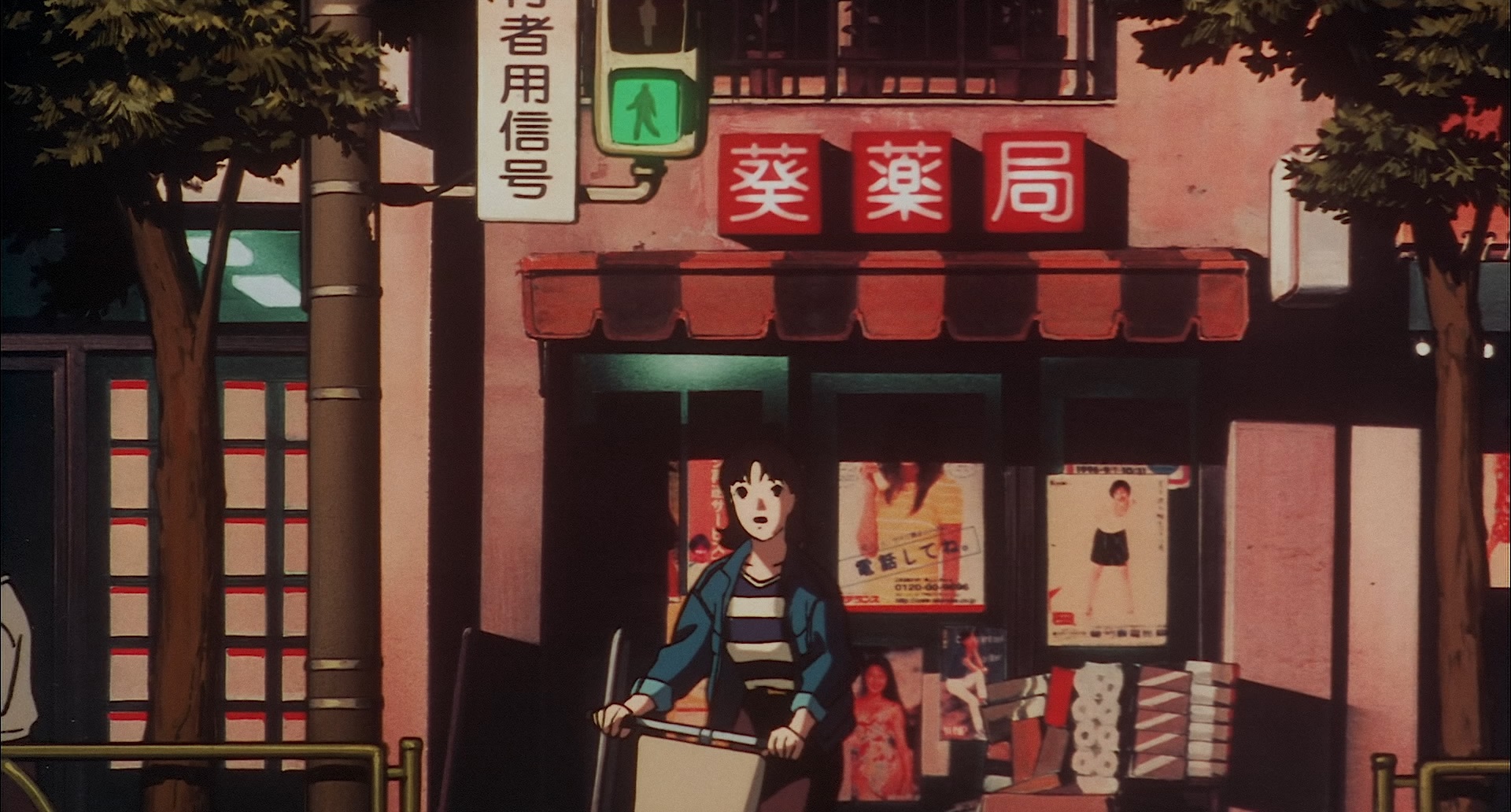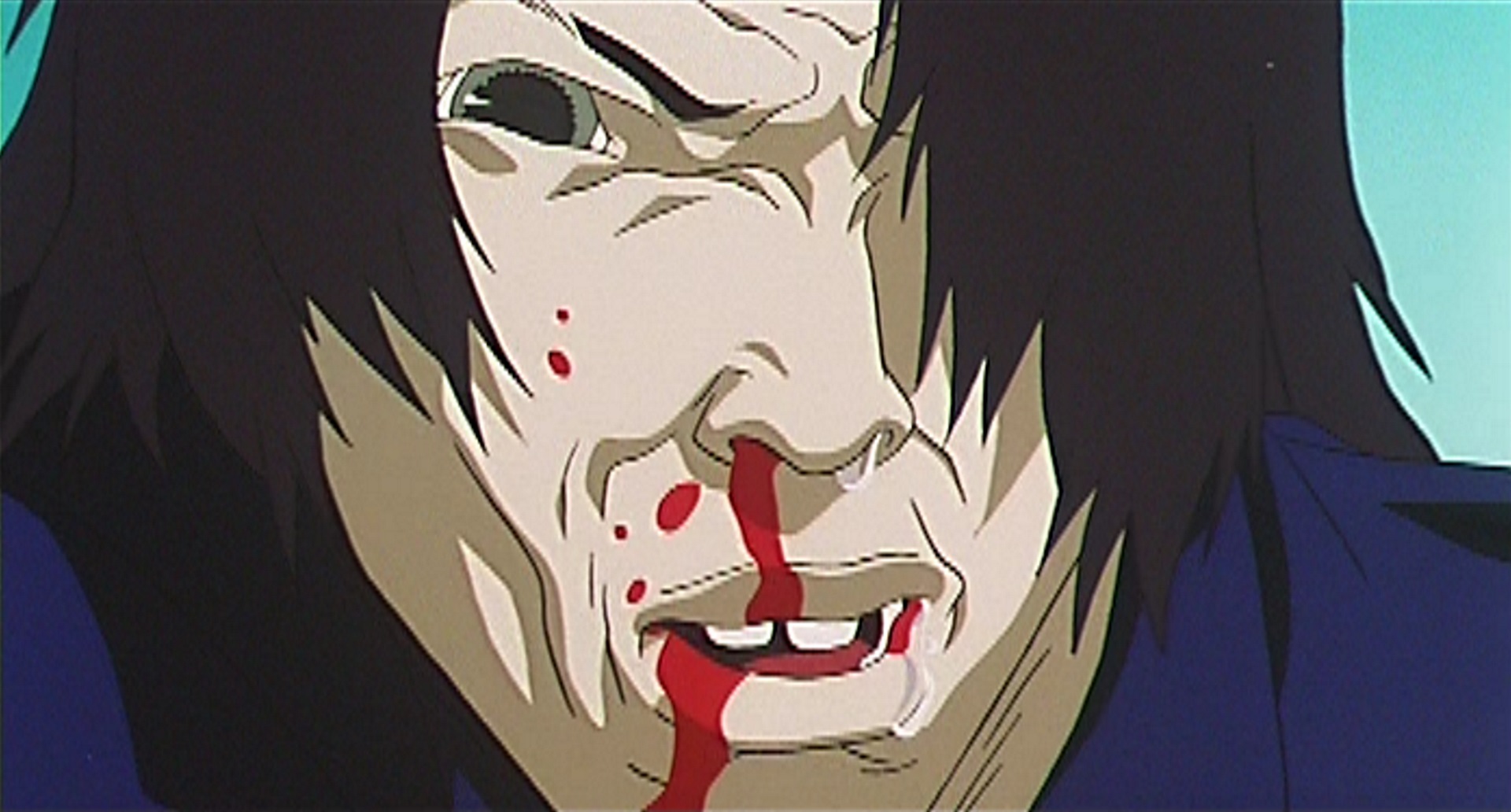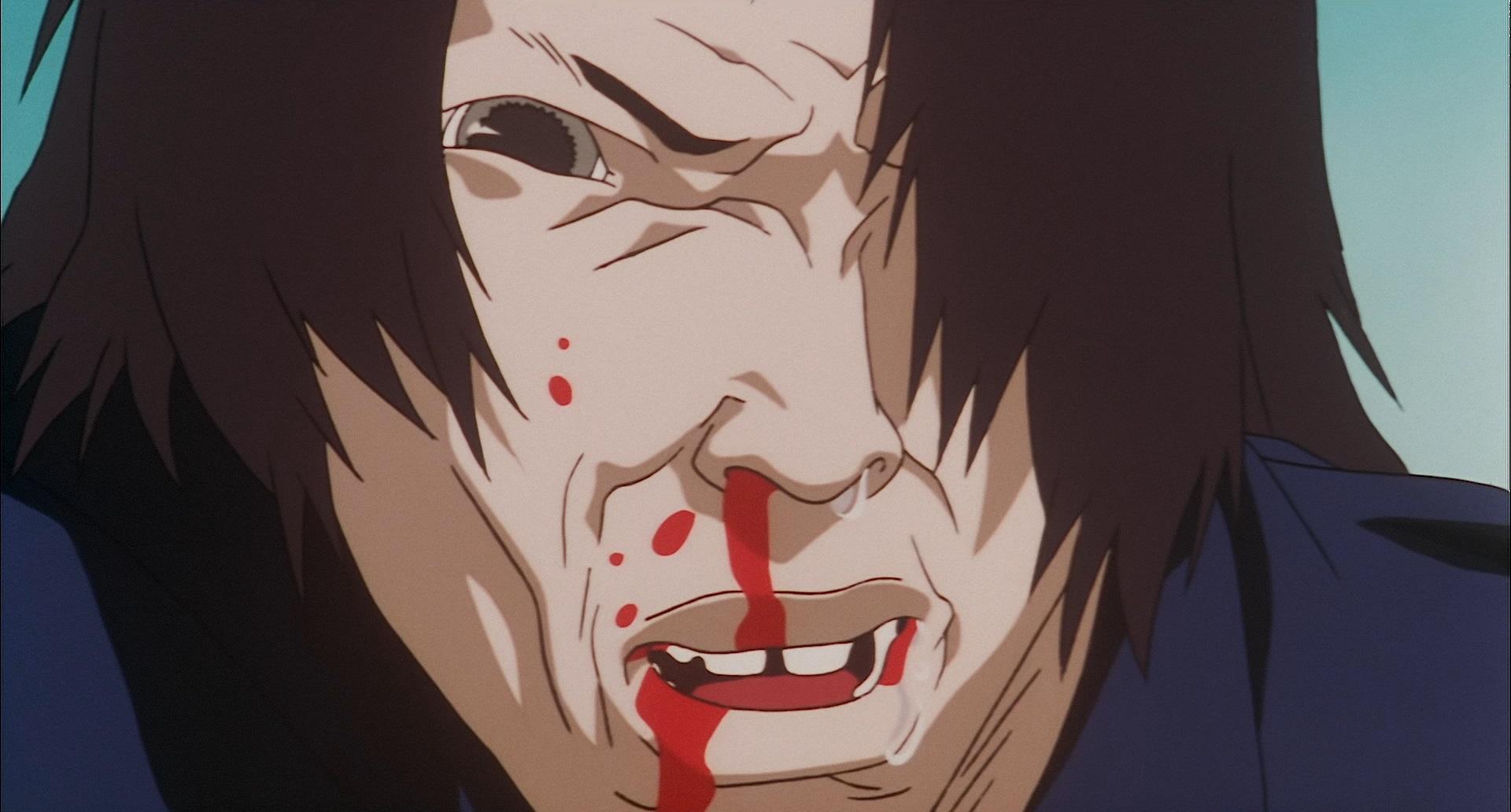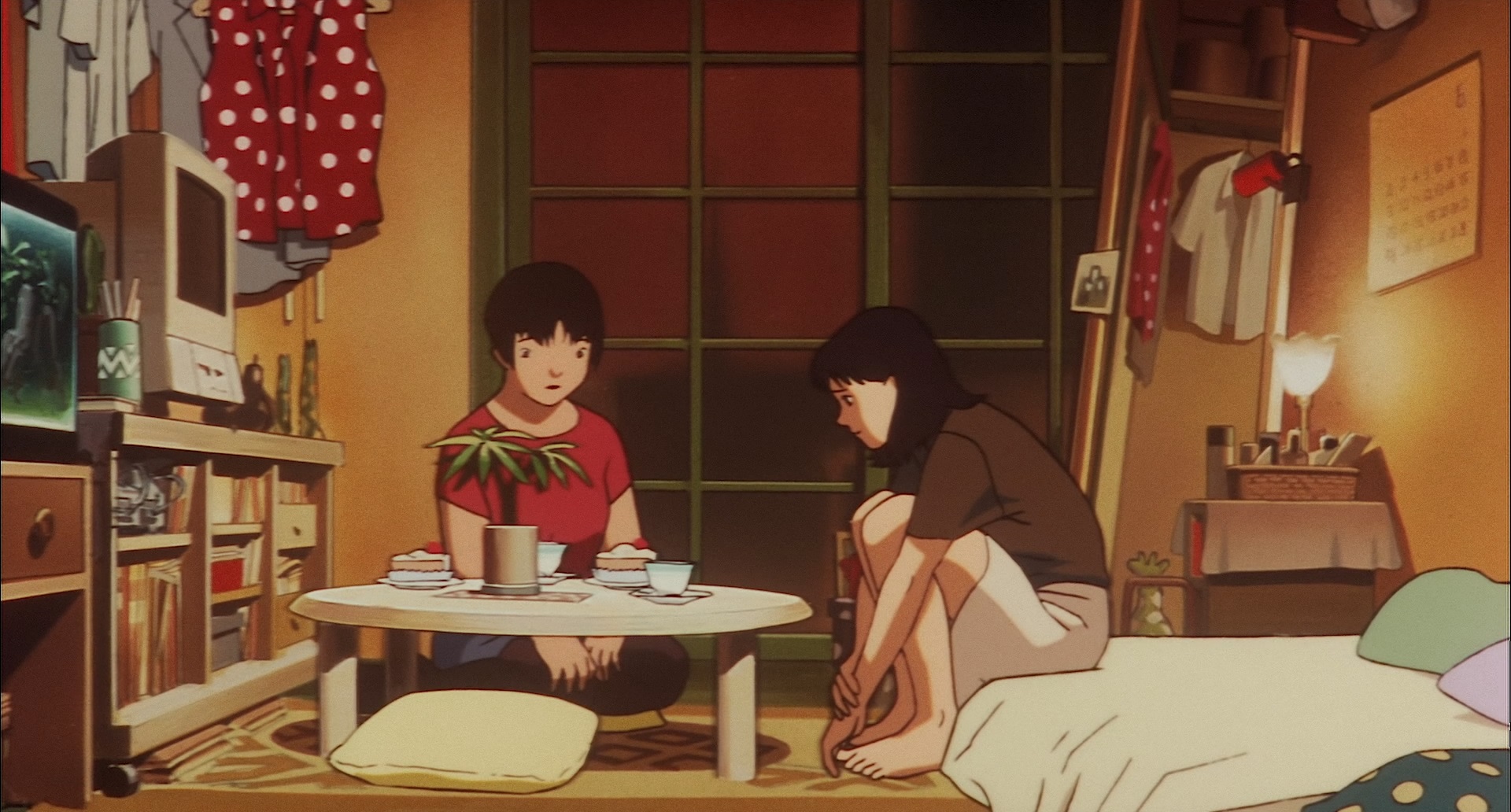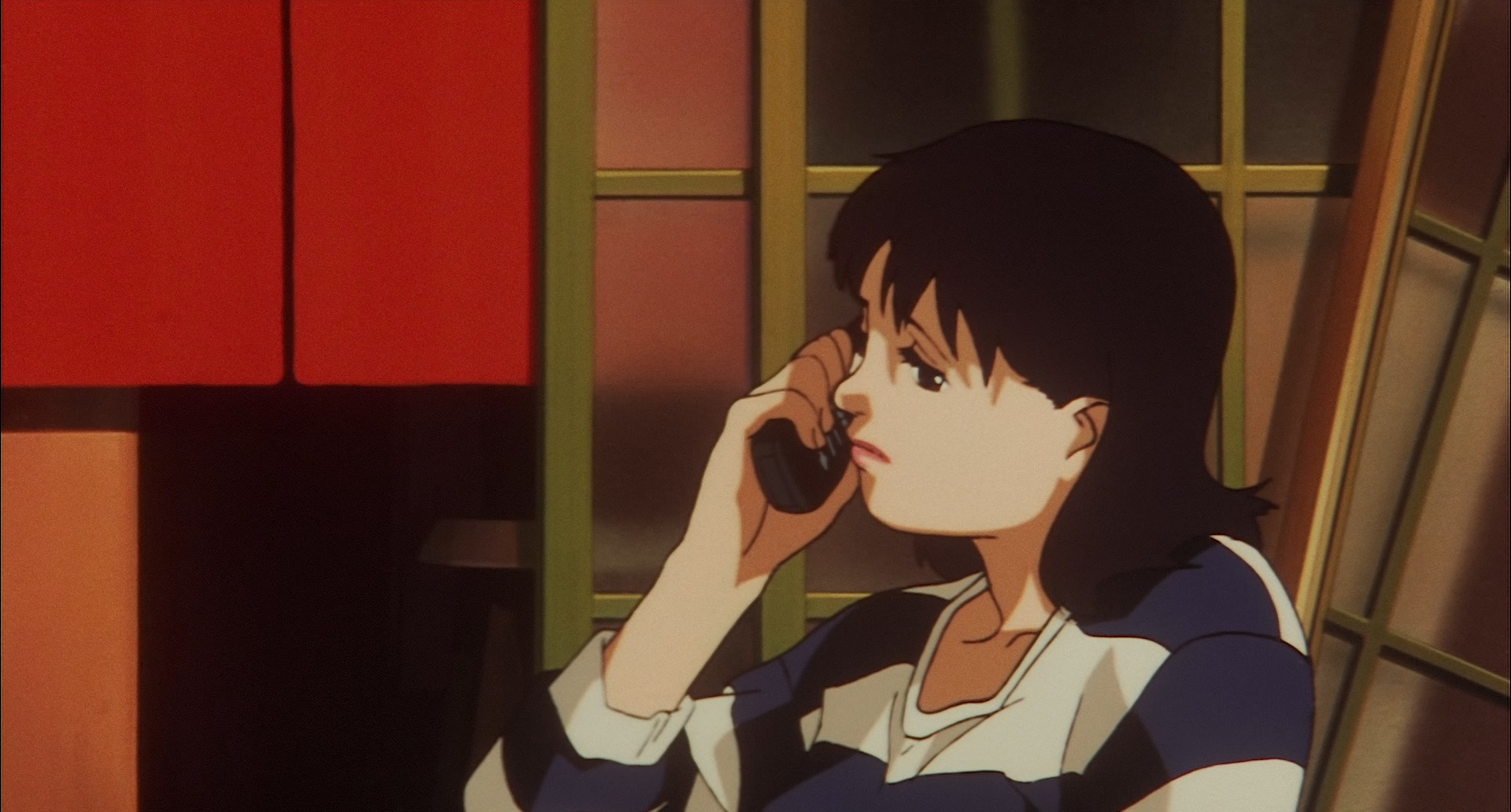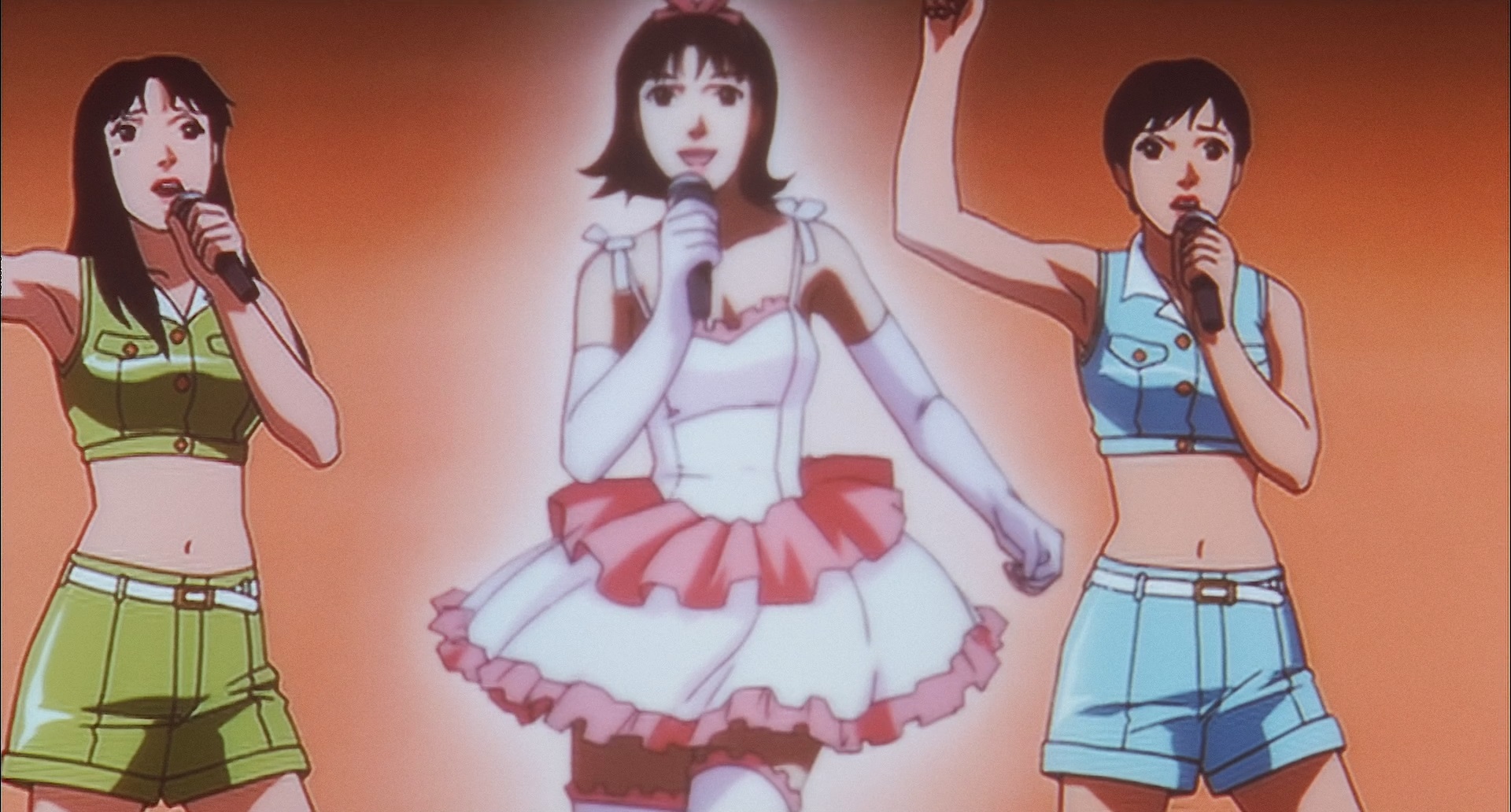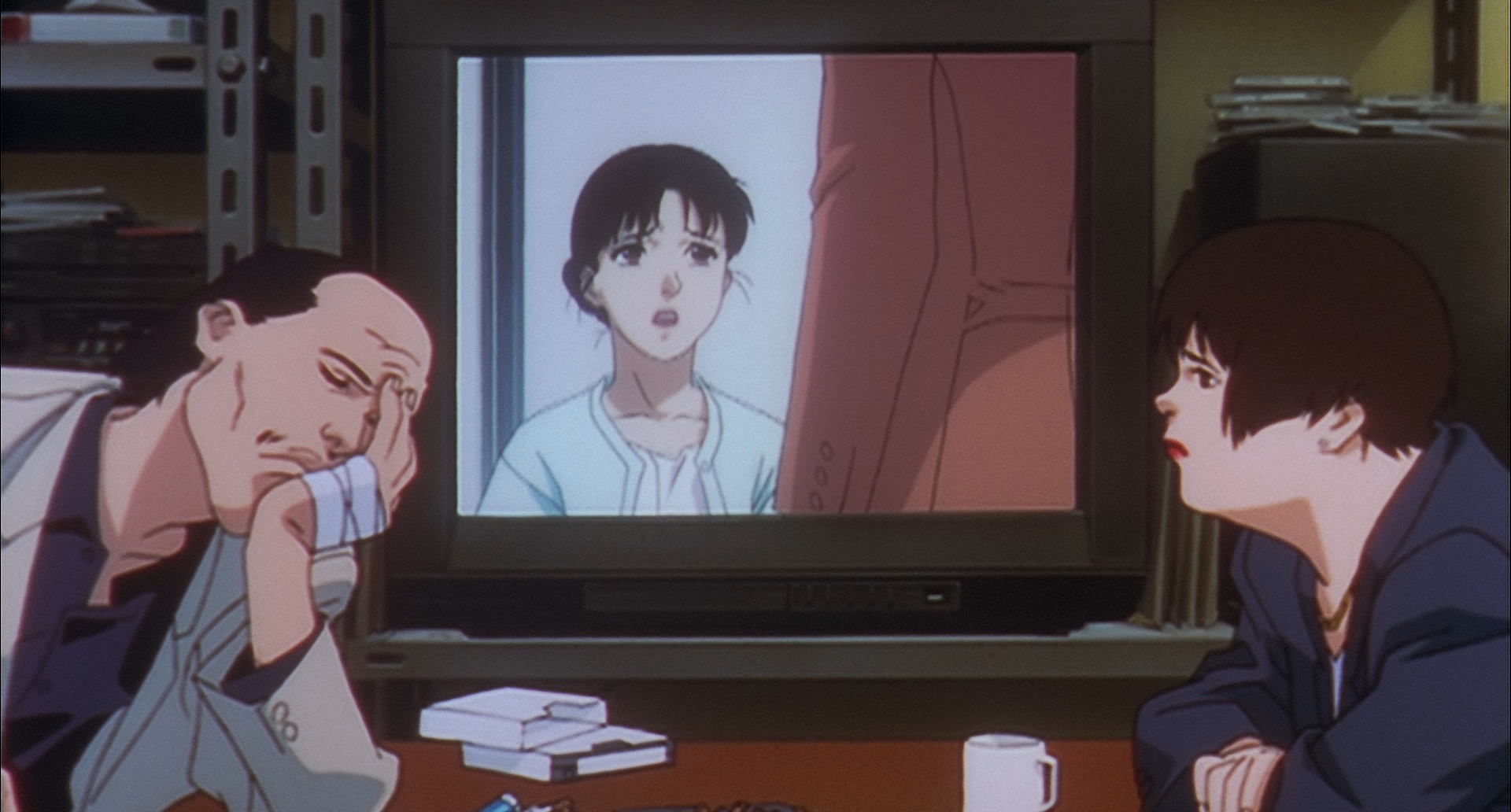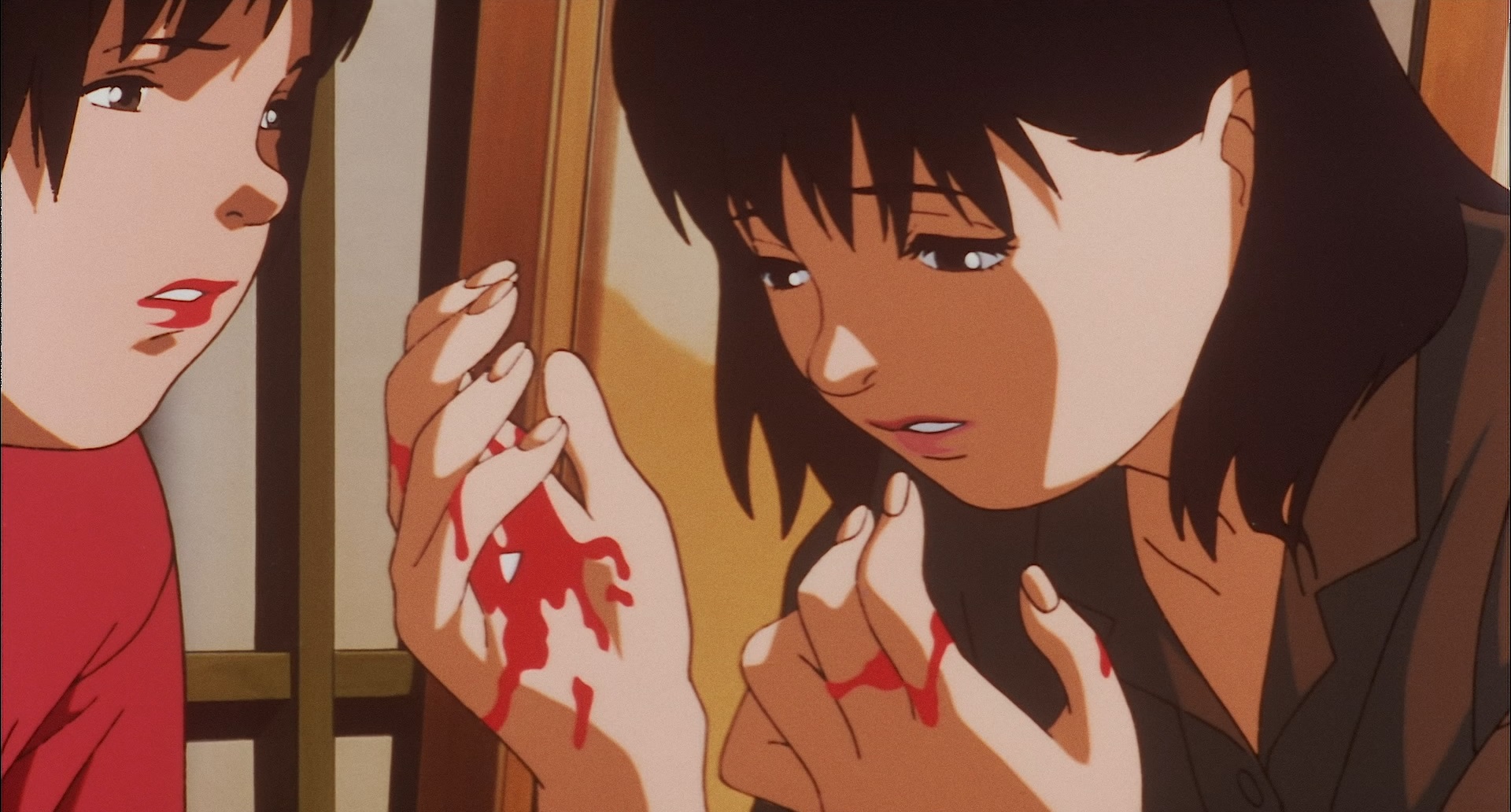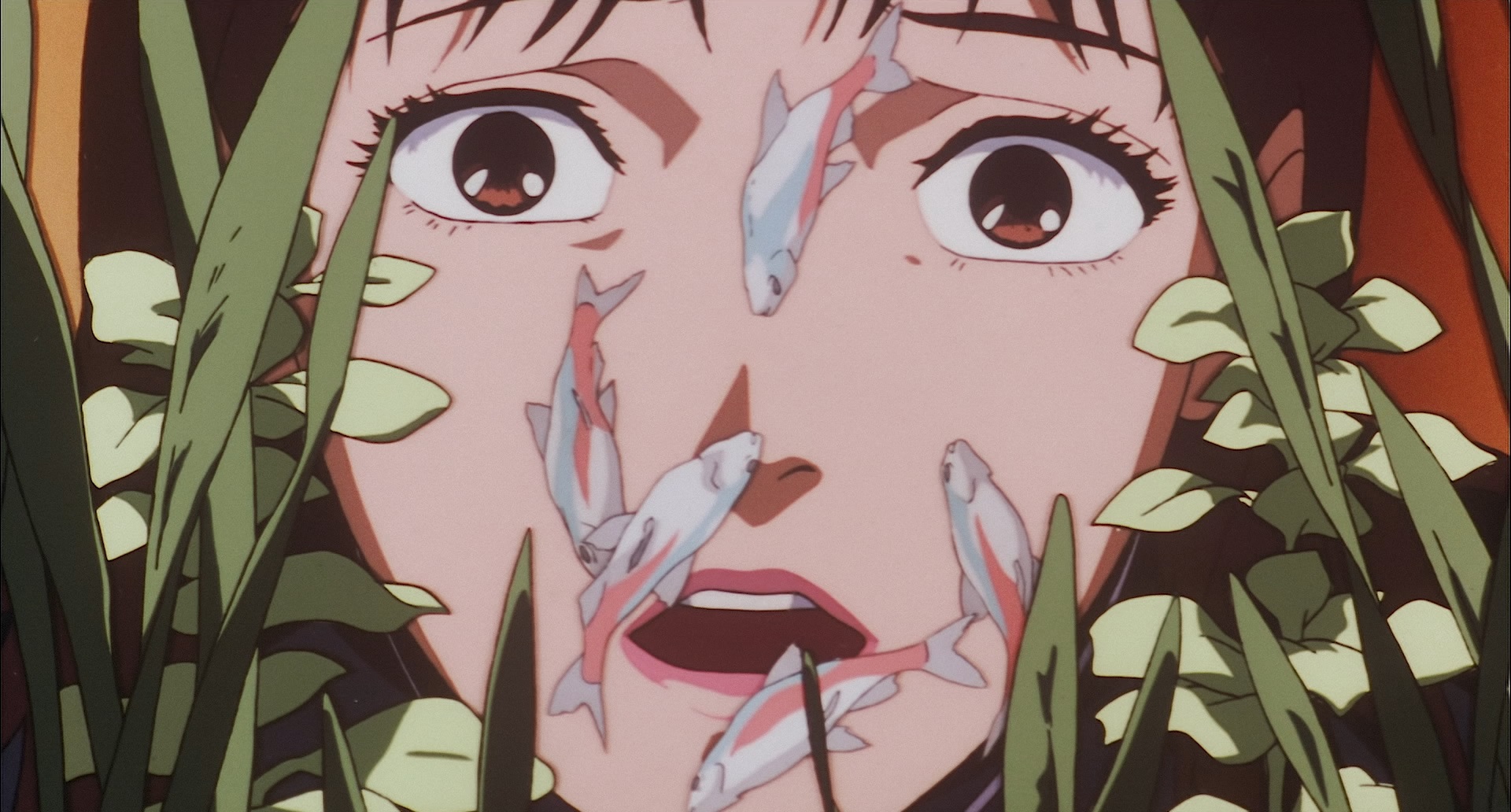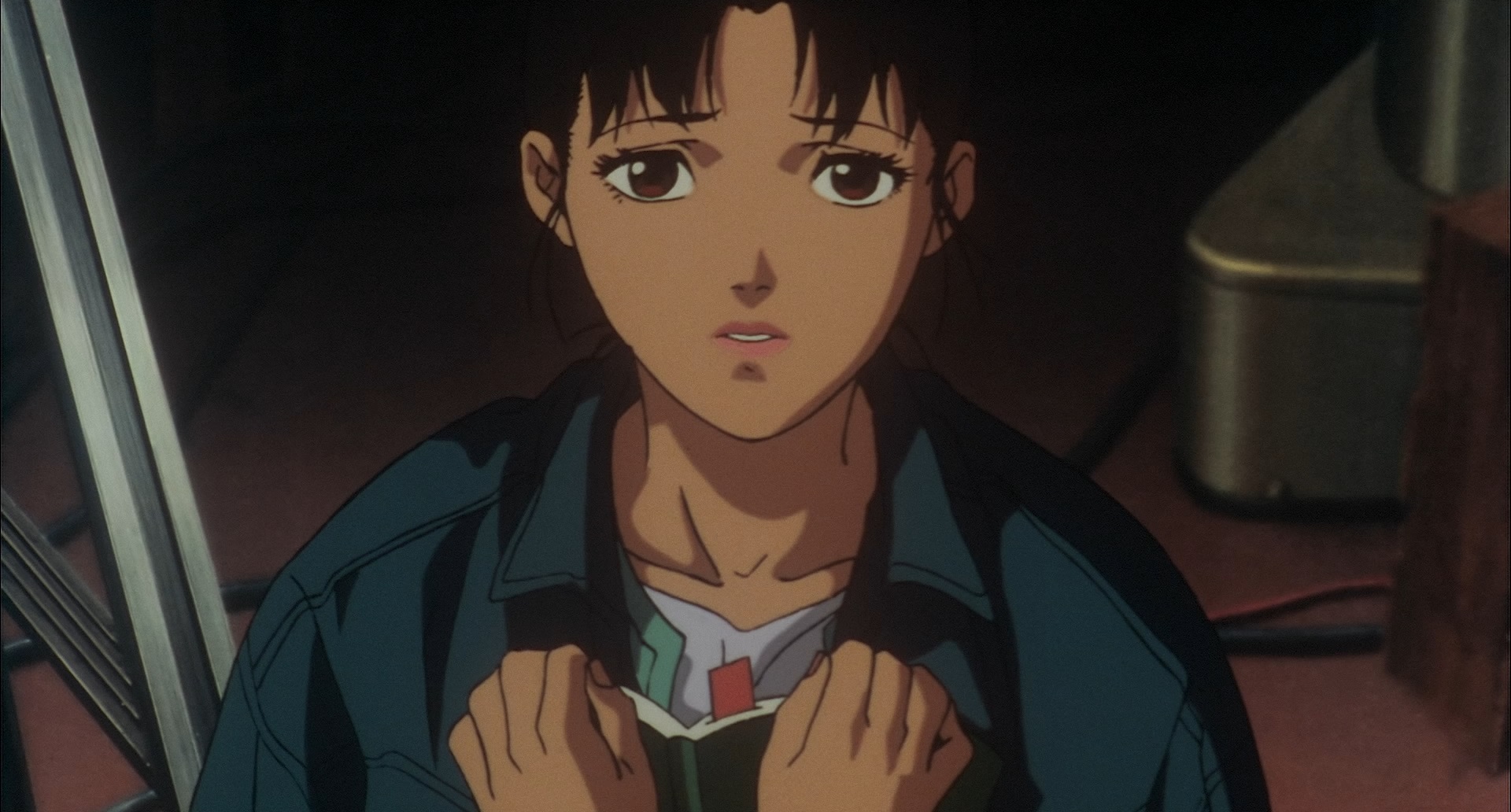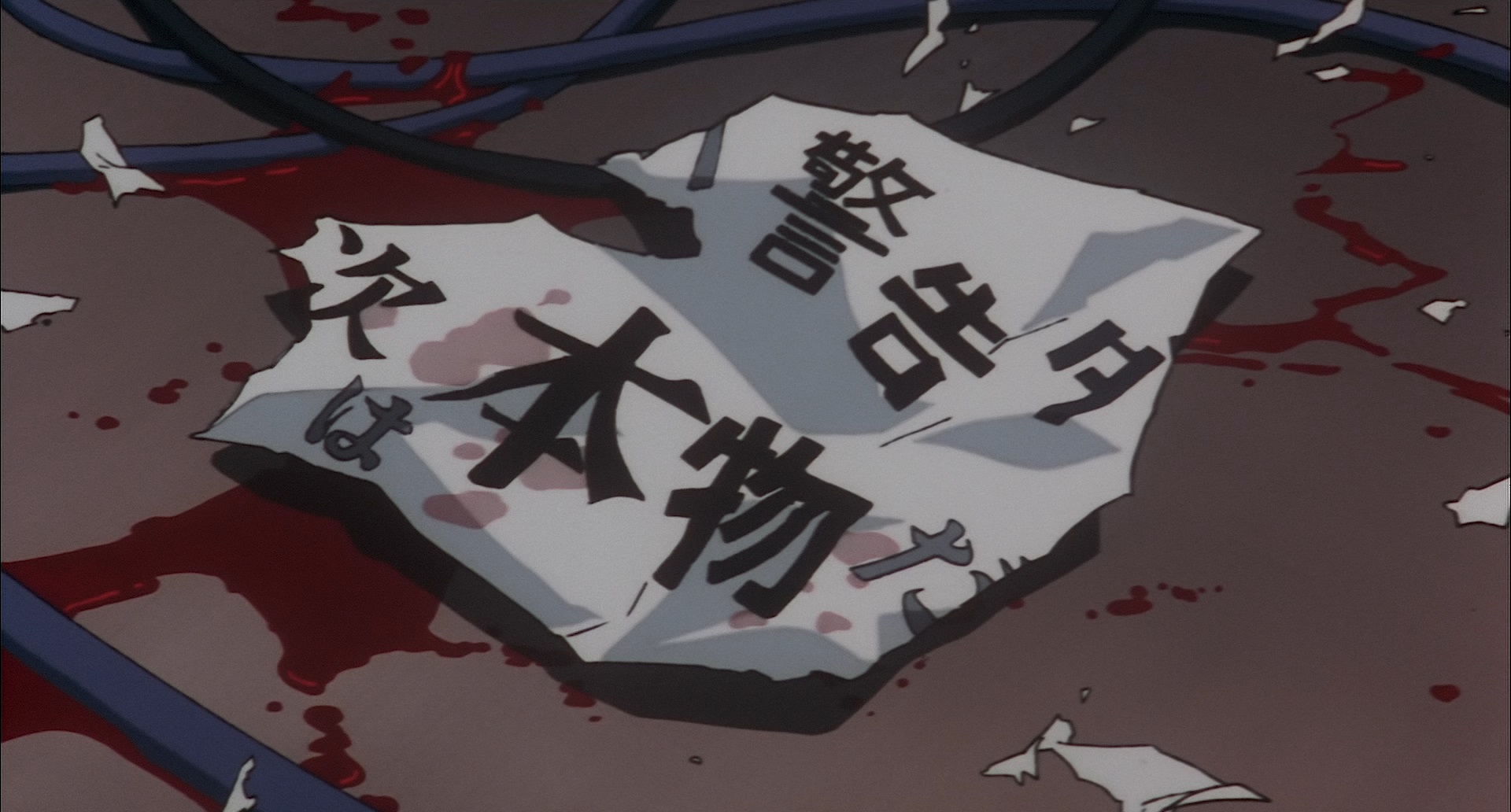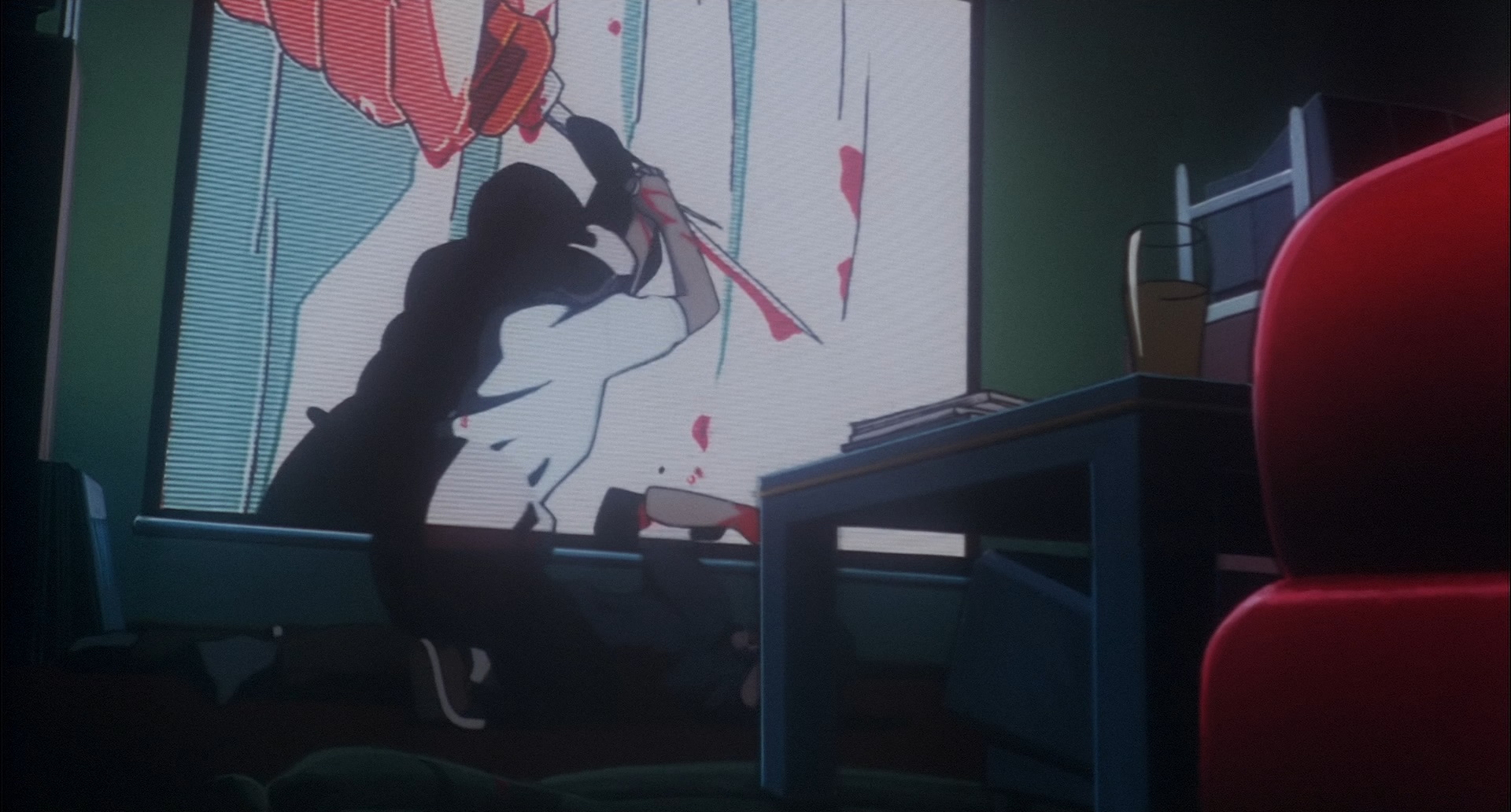| Reviews & Columns |
|
Reviews DVD TV on DVD Blu-ray 4K UHD International DVDs In Theaters Reviews by Studio Video Games Features Collector Series DVDs Easter Egg Database Interviews DVD Talk Radio Feature Articles Columns Anime Talk DVD Savant Horror DVDs The M.O.D. Squad Art House HD Talk Silent DVD
|
DVD Talk Forum |
|
|
| Resources |
|
DVD Price Search Customer Service #'s RCE Info Links |
|
Columns
|
|
|
Perfect Blue
GKIDS Films // R // March 26, 2019
List Price: $26.99 [Buy now and save at Amazon]
Mima Kirigoe's career is at a crossroads. Her idol group, CHAM!, has amassed a modest following over the years but has never managed to crack the charts. Mima has flirted with acting along the way, but an excess of scheduling conflicts has forced a decision. The group's representation is split over which course to take – unsurprising, given that her manager Rumi was a pop idol herself in years past – but it's ultimately decided that there's more of a future for Mima as an actress.
It's not an easy transition. As comfortable as Mima is performing on the concert stage, acting on a soundstage proves to be a far more overwhelming proposition. Hard-working though she is, Mima is hardly a naturally gifted actress, nor is she taken all that seriously, given her idol past. As she dutifully delivers a handful of throwaway lines every week on a TV crime drama, the remaining members of CHAM! at long last begin their ascent on the pop charts. When the series' head writer at long last figures out what to do with Mima, her character's arc revolves around a graphic, gruelingly intense rape sequence – inexorably ending her life as a squeaky-clean pop idol.
Up to this point unwaveringly optimistic and always beaming a confident smile, Mima just doesn't want to let anybody down. If she's told that this is the next step she must take to advance her career, then Mima's going to give it her all, regardless of what she herself desires. Nevermind that it's a simulated attack or the politeness of the actor who gropes her exposed breast and thrusts himself into her again and again and again – something within her shatters.
The innocence that so long defined Mima continues to be ravaged. The lines separating illusion from reality blur. She can no longer distinguish between dreaming or laying wide awake. The idol persona that she effectively murdered becomes an all-too-real presence, tormenting Mima about the dark path she's chosen to walk...threatening to reclaim the ebullient life that she abandoned. Compounding her stress is the fan website – seemingly written in Mima's own words – that reveal her every movement, words exchanged in private, and innermost thoughts she could never bring herself to speak aloud. Those who've led Mima down this road are systematically being murdered, and, having crossed far past a point of no return, she too may find herself in the killer's crosshairs.
Satoshi Kon (Paprika) directs this challenging, artful, unnervingly intense film with such supreme confidence that it's startling to conceive that he'd never before helmed a feature film on his own. Perfect Blue is, at its core, a film about identity and perception – the contrast between how we present ourselves to the world versus who we are inside, the sublimation of self that comes with celebrity, and the fascination and ownership that fanatics too often direct towards those they idolize. It's no coincidence that so much of Perfect Blue is oriented around reflections, panes of glass, or television screens. Further still, this is a film that quite literally skewers the male gaze.
The combination of fluid, expressive animation, Kon's unflinching eye, and a stellar performance by voice actress Junko Iwao immerses viewers in Mima's plight. This extends far beyond the simulated rape, though this is a sequence that demands to be discussed. That it's animated in no way detracts from the power and intensity of the lengthy attack. Even as a viewer, it's devastating to endure. The way a numbed Mima's head drops down – exhausted, succumbing, defeated – haunts me in a way that few films have.
Pains are taken to ensure that she isn't an overtly fictional character moved where the plot requires her to be at any given moment; Mima is very much realized as a person, worthy of our emotional investment. She is both the central character and the audience. We share her confusion as Mima struggles to distinguish between hallucinations and reality...between scenes on her TV show and her daily life...between what's just transpired and what occurred weeks earlier. We share her excitement. We share her pain. While Perfect Blue succeeds as a murder mystery, its primary drive is not in unmasking a killer or in frenzied cat-and-mouse chases. It's about Mima's breakdown and loss of identity. It's a condemnation of the male gaze, whether it's in the lurid, fully nude photographs taken of Mima or the equally lustful fascination of bubblegum pop idols in tiny skirts. (Note how few female audience members there are at the CHAM! show and how few female characters there are to be found throughout Perfect Blue in general.) It's about the obligations of celebrity. It's about the darker, more toxic side of fandom. It's about self. The thematically rich Perfect Blue is such a rewarding film to analyze and discuss, and yet that doesn't detract from its more visceral merits as a psychological thriller either.
As prone as I am to cringing whenever a film critic unleashes the likes of perfect or masterpiece, it's not the least bit hyperbolic to apply those to Perfect Blue. Every subtlety in every frame has been meticulously considered. There's neither a misstep to be found nor a frame I'd change. None of its more intense, revealing moments are vacuous thrills or titillation – they mean something, all. Perfect Blue has long ranked among the most extraordinary films I've ever seen, regardless of genre or style, and the sole reason I haven't revisited it in so many years is that the nearly twenty year old DVD release by Manga Entertainment looks so wretched these days. Following GKIDS' theatrical re-release last year, Perfect Blue has at long last found its way to Blu-ray on these shores. Though its presentation doesn't approach the heights of GKIDS' most striking anime releases, and a more extensive selection of extras would certainly have been appreciated, the end result is still very deserving of this site's highest possible rating. DVD Talk Collector Series.
Video
In a word: revelatory.
Admittedly, my image capture method exaggerates the interlaced video of the original standard definition presentation, but that doesn't detract from the greater point. Perfect Blue easily ranks among the most compelling upgrades I've come across in my twelve years of Blu-ray reviews. Manga Entertainment's original DVD looked lackluster when it first arrived nearly twenty years ago, and it's aged so poorly as to be nearly unwatchable. It's presented in non-anamorphic widescreen, black levels are anemic, and the excessive oversharpening saddles it with an unsettlingly video-like appearance. And the colors...! Dreadful and quite literally a relic from another era.
The presentation on this Blu-ray release is, by comparison, immeasurably more filmic and cinematic. It's such a startling improvement that I almost feel guilty about pointing out some of the disc's imperfections. Colors sometimes don't seem to quite match from one shot to the next, even within the space of a single scene. The image has a tendency to wobble. That's generally so mild that the instability only really grabbed my attention a handful of times, but it to some extent is persistent throughout the film. Perfect Blue as a whole is rather soft:
The "newly remastered" sticker on the slipcover is all the indication we're provided as far as what elements were used or when and where it was scanned. I'm not exactly left with the impression that this is a 4K scan of the original negative. Though it's hardly a pervasive concern and amounts to just a few seconds of footage, all told, there are a couple of points where film elements clearly weren't available, and the team behind this remaster had to resort to standard definition video:
Film grain – or the closest thing to it – looks more like video noise to my eyes, but I only found myself feeling this way upon very close inspection:
Still, soft though it is, I'm generally pleased with the definition and clarity on display throughout Perfect Blue. Damage and wear are effectively non-existent, and I only spotted a handful of specks throughout the entirety of the film. I suspect that most of these concerns can be traced back to lack of availability of better film elements and/or the way the movie was originally produced. And honestly, none of the issues I've pointed out bother me in the slightest. Even acknowledging its imperfections, I'm thrilled to at long last experience a longtime favorite in high definition. Perfect Blue still very much boasts a strong presentation, and I enthusiastically recommend what GKIDS and Anime Limited have delivered here. This is as essential an upgrade as they come, as well as serving as a marvelous introduction to those who haven't yet witnessed Satoshi Kon's masterpiece.
Perfect Blue is lightly letterboxed to preserve its theatrical aspect ratio of 1.85:1. The film and its extras arrive on a dual-layer Blu-ray disc.
Audio
As extensive as its audio options appear to be at first glance, only one of Perfect Blue's three soundtracks is lossless: its Japanese 5.1 remix, presented in 16-bit DTS-HD Master Audio. The original Japanese mono track and the six-channel English remix are limited to Dolby Digital – the former with a bitrate of 256kbps and the latter delivered at DVD-quality 448kbps. I sampled the other two soundtracks but primarily watched Perfect Blue in Japanese and in 5.1. I particularly struggled to embrace the English dub, especially upon hearing Mr. Me-Mania finally speak, sounding as if he lives in a pineapple under the sea.
The lossless, multichannel Japanese audio wastes no time distinguishing itself from the mono track elsewhere on the disc. This is an effective and particularly immersive remix that rarely relents. Much attention is paid towards directionality and atmospherics, whether it's a car rushing by in the background, the full-scale riot interrupting Mima's announcement at the CHAM! concert, a dizzying and inescapable assault of camera flashes, or the escalation of the pounding, punishing score as Mima realizes her every move is being monitored. There are a couple of times, including the Super Sentai opening sequence, when the bass sounds as if it's dialed up excessively. For what it's worth, the story is much the same in the original monaural audio as well. Dialogue is clean and readily discerned. No element unduly struggles for placement in the mix. Everything I'm hearing is distinct and reproduced with dazzling clarity. There are no overt flaws of any sort worth grousing and groaning about. My only complaint, really, is that the other two soundtracks aren't lossless as well, and I assume that's only because the licensor didn't provide them.
Perfect Blue features three sets of subtitles – a translation of the original Japanese dialogue, an SDH stream based on the English dub, and a more sparsely used track limited to translating songs and on-screen Japanese text.
Extras
Perfect Blue arrives in a slipcover mirroring the decidedly blue artwork. This combo pack also includes a DVD.
The Final Word
I'll confess to struggling somewhat with the final rating. I'm pleased with this presentation of Perfect Blue, but its soft, somewhat wobbly visuals and limited lossless audio options aren't deserving of a full five stars each. The tragic loss of Satoshi Kon at such a young age limits what new extras could be produced, though certainly there's room for interviews with those influenced by the film, storyboards, or even just trailers for more of Kon's work. This is not the definitive release of Perfect Blue. Still, this is a masterfully crafted, enduring, and important film. Its presentation, though imperfect, remains compelling, and its extras are all well-worth taking the time to watch. What GKIDS and Anime Limited have produced is richly deserving of a spot in any cineaste's collection, and, accordingly, this anxiously anticipated Blu-ray release deserves its place in DVD Talk's Collector Series.
It's not an easy transition. As comfortable as Mima is performing on the concert stage, acting on a soundstage proves to be a far more overwhelming proposition. Hard-working though she is, Mima is hardly a naturally gifted actress, nor is she taken all that seriously, given her idol past. As she dutifully delivers a handful of throwaway lines every week on a TV crime drama, the remaining members of CHAM! at long last begin their ascent on the pop charts. When the series' head writer at long last figures out what to do with Mima, her character's arc revolves around a graphic, gruelingly intense rape sequence – inexorably ending her life as a squeaky-clean pop idol.
Up to this point unwaveringly optimistic and always beaming a confident smile, Mima just doesn't want to let anybody down. If she's told that this is the next step she must take to advance her career, then Mima's going to give it her all, regardless of what she herself desires. Nevermind that it's a simulated attack or the politeness of the actor who gropes her exposed breast and thrusts himself into her again and again and again – something within her shatters.
The innocence that so long defined Mima continues to be ravaged. The lines separating illusion from reality blur. She can no longer distinguish between dreaming or laying wide awake. The idol persona that she effectively murdered becomes an all-too-real presence, tormenting Mima about the dark path she's chosen to walk...threatening to reclaim the ebullient life that she abandoned. Compounding her stress is the fan website – seemingly written in Mima's own words – that reveal her every movement, words exchanged in private, and innermost thoughts she could never bring herself to speak aloud. Those who've led Mima down this road are systematically being murdered, and, having crossed far past a point of no return, she too may find herself in the killer's crosshairs.
Satoshi Kon (Paprika) directs this challenging, artful, unnervingly intense film with such supreme confidence that it's startling to conceive that he'd never before helmed a feature film on his own. Perfect Blue is, at its core, a film about identity and perception – the contrast between how we present ourselves to the world versus who we are inside, the sublimation of self that comes with celebrity, and the fascination and ownership that fanatics too often direct towards those they idolize. It's no coincidence that so much of Perfect Blue is oriented around reflections, panes of glass, or television screens. Further still, this is a film that quite literally skewers the male gaze.
The combination of fluid, expressive animation, Kon's unflinching eye, and a stellar performance by voice actress Junko Iwao immerses viewers in Mima's plight. This extends far beyond the simulated rape, though this is a sequence that demands to be discussed. That it's animated in no way detracts from the power and intensity of the lengthy attack. Even as a viewer, it's devastating to endure. The way a numbed Mima's head drops down – exhausted, succumbing, defeated – haunts me in a way that few films have.
Pains are taken to ensure that she isn't an overtly fictional character moved where the plot requires her to be at any given moment; Mima is very much realized as a person, worthy of our emotional investment. She is both the central character and the audience. We share her confusion as Mima struggles to distinguish between hallucinations and reality...between scenes on her TV show and her daily life...between what's just transpired and what occurred weeks earlier. We share her excitement. We share her pain. While Perfect Blue succeeds as a murder mystery, its primary drive is not in unmasking a killer or in frenzied cat-and-mouse chases. It's about Mima's breakdown and loss of identity. It's a condemnation of the male gaze, whether it's in the lurid, fully nude photographs taken of Mima or the equally lustful fascination of bubblegum pop idols in tiny skirts. (Note how few female audience members there are at the CHAM! show and how few female characters there are to be found throughout Perfect Blue in general.) It's about the obligations of celebrity. It's about the darker, more toxic side of fandom. It's about self. The thematically rich Perfect Blue is such a rewarding film to analyze and discuss, and yet that doesn't detract from its more visceral merits as a psychological thriller either.
As prone as I am to cringing whenever a film critic unleashes the likes of perfect or masterpiece, it's not the least bit hyperbolic to apply those to Perfect Blue. Every subtlety in every frame has been meticulously considered. There's neither a misstep to be found nor a frame I'd change. None of its more intense, revealing moments are vacuous thrills or titillation – they mean something, all. Perfect Blue has long ranked among the most extraordinary films I've ever seen, regardless of genre or style, and the sole reason I haven't revisited it in so many years is that the nearly twenty year old DVD release by Manga Entertainment looks so wretched these days. Following GKIDS' theatrical re-release last year, Perfect Blue has at long last found its way to Blu-ray on these shores. Though its presentation doesn't approach the heights of GKIDS' most striking anime releases, and a more extensive selection of extras would certainly have been appreciated, the end result is still very deserving of this site's highest possible rating. DVD Talk Collector Series.
Video
In a word: revelatory.
Admittedly, my image capture method exaggerates the interlaced video of the original standard definition presentation, but that doesn't detract from the greater point. Perfect Blue easily ranks among the most compelling upgrades I've come across in my twelve years of Blu-ray reviews. Manga Entertainment's original DVD looked lackluster when it first arrived nearly twenty years ago, and it's aged so poorly as to be nearly unwatchable. It's presented in non-anamorphic widescreen, black levels are anemic, and the excessive oversharpening saddles it with an unsettlingly video-like appearance. And the colors...! Dreadful and quite literally a relic from another era.
The presentation on this Blu-ray release is, by comparison, immeasurably more filmic and cinematic. It's such a startling improvement that I almost feel guilty about pointing out some of the disc's imperfections. Colors sometimes don't seem to quite match from one shot to the next, even within the space of a single scene. The image has a tendency to wobble. That's generally so mild that the instability only really grabbed my attention a handful of times, but it to some extent is persistent throughout the film. Perfect Blue as a whole is rather soft:
The "newly remastered" sticker on the slipcover is all the indication we're provided as far as what elements were used or when and where it was scanned. I'm not exactly left with the impression that this is a 4K scan of the original negative. Though it's hardly a pervasive concern and amounts to just a few seconds of footage, all told, there are a couple of points where film elements clearly weren't available, and the team behind this remaster had to resort to standard definition video:
Film grain – or the closest thing to it – looks more like video noise to my eyes, but I only found myself feeling this way upon very close inspection:
Still, soft though it is, I'm generally pleased with the definition and clarity on display throughout Perfect Blue. Damage and wear are effectively non-existent, and I only spotted a handful of specks throughout the entirety of the film. I suspect that most of these concerns can be traced back to lack of availability of better film elements and/or the way the movie was originally produced. And honestly, none of the issues I've pointed out bother me in the slightest. Even acknowledging its imperfections, I'm thrilled to at long last experience a longtime favorite in high definition. Perfect Blue still very much boasts a strong presentation, and I enthusiastically recommend what GKIDS and Anime Limited have delivered here. This is as essential an upgrade as they come, as well as serving as a marvelous introduction to those who haven't yet witnessed Satoshi Kon's masterpiece.
Perfect Blue is lightly letterboxed to preserve its theatrical aspect ratio of 1.85:1. The film and its extras arrive on a dual-layer Blu-ray disc.
Audio
As extensive as its audio options appear to be at first glance, only one of Perfect Blue's three soundtracks is lossless: its Japanese 5.1 remix, presented in 16-bit DTS-HD Master Audio. The original Japanese mono track and the six-channel English remix are limited to Dolby Digital – the former with a bitrate of 256kbps and the latter delivered at DVD-quality 448kbps. I sampled the other two soundtracks but primarily watched Perfect Blue in Japanese and in 5.1. I particularly struggled to embrace the English dub, especially upon hearing Mr. Me-Mania finally speak, sounding as if he lives in a pineapple under the sea.
The lossless, multichannel Japanese audio wastes no time distinguishing itself from the mono track elsewhere on the disc. This is an effective and particularly immersive remix that rarely relents. Much attention is paid towards directionality and atmospherics, whether it's a car rushing by in the background, the full-scale riot interrupting Mima's announcement at the CHAM! concert, a dizzying and inescapable assault of camera flashes, or the escalation of the pounding, punishing score as Mima realizes her every move is being monitored. There are a couple of times, including the Super Sentai opening sequence, when the bass sounds as if it's dialed up excessively. For what it's worth, the story is much the same in the original monaural audio as well. Dialogue is clean and readily discerned. No element unduly struggles for placement in the mix. Everything I'm hearing is distinct and reproduced with dazzling clarity. There are no overt flaws of any sort worth grousing and groaning about. My only complaint, really, is that the other two soundtracks aren't lossless as well, and I assume that's only because the licensor didn't provide them.
Perfect Blue features three sets of subtitles – a translation of the original Japanese dialogue, an SDH stream based on the English dub, and a more sparsely used track limited to translating songs and on-screen Japanese text.
Extras
- Original SD Version (81 min.; SD): Its dated, lackluster presentation aside, I'm not able to quickly spot any noteworthy differences in this second version of Perfect Blue. The same as Manga Entertainment's DVD before it, this non-anamorphic, standard definition presentation is uncut, complete with the public hair, extended rape sequences, and grislier murders that set it apart from the R-rated version. The audio options are largely the same as its high-def counterpart as well, consisting of Japanese mono, a Japanese 5.1 remix, a six-channel English dub, and a similar selection of subtitles.
- English Credits (4 min.; SD): ...and, yes, these English credits are the same as what plays at the end of that standard definition version.
- Satoshi Kon Lecture (41 min.; HD): This three-part lecture series explores a few specific sequences at length. First, director Satoshi Kon delves into how the Super Sentai-styled opening reflects the masks – the personas, the façades – that we present to the world at large.
He also speaks about how Perfect Blue was originally intended to be an OVA, which influenced both the kid-friendly thrills of the opening and the simulated rape later in the film. After noting that he feels this attack is far too graphic, Kon delves into some of the visual metaphors, such as how Mima's subsequent wearing of black represents her mourning the death of the pop idol she once was and the significance of her two surviving pet fish.
Finally, Kon discusses the intercutting of Mima's nude photo shoot with the wholesome, upbeat CHAM! concert, devoting more time than one might expect to Darren Aronofsky's homage to Perfect Blue with Jennifer Connelly's bathtub scene in Requiem for a Dream. If Kon hadn't passed away shortly before the release of Aronofsky's Black Swan, he surely would've been left with more to say still. Kon closes with his interpretation of the epilogue, including the final line of the film and the deliberate method in which it's visually presented.
- "Angel of Your Heart" (9 min.; mix of SD and HD): Everyone's favorite CHAM! smash hit is presented in two very different ways. First up is a behind-the-scenes look at three singers belting out "Angel of Your Heart" in the song's original Japanese during one of the recording sessions. The English version of the song is also presented in full, playing over a 1080p still from the film.
- Trailers (5 min.; mix of SD and HD): There are three trailers in all: a non-anamorphic, standard definition promo from the Manga Entertainment days, a high-def trailer from the recent theatrical re-release in the UK, and a 1080p scan of the original Japanese trailer from film elements.
- Interviews (23 min.; SD): Rounding out the extras are five archival interviews, beginning with a conversation with first-time feature director Satoshi Kon (11 min.). He notes that it was briefly considered to make Perfect Blue more straightforward, though the team ultimately decided to keep the audience guessing. Still, he finds the film far more straightforward and easy to follow than many viewers. Afterwards, Junko Iwao devotes much of her six minute interview drawing parallels between herself and the character she was tasked to bring to life. She too had reservations about taking on such a challenging role in a violent drama, and the advice and internal thought process that led her to accept is much the same as Mima's.
Three of the key actors behind the English dub are represented here as well, in a series of brief conversations that clock in at a little over two minutes each. Ruby Marlowe speaks about recording the real Mima and the virtual Mima separately. In what is largely a psychological analysis, Wendee Lee touches on how she developed the character of Rumi and how she as an actress relates to her on a certain level. Finally, Bob Marx discusses his performance of Mr. Me-Mania, as well as the allure Mima holds to his damaged character and how open Perfect Blue is to interpretation.
Perfect Blue arrives in a slipcover mirroring the decidedly blue artwork. This combo pack also includes a DVD.
The Final Word
I'll confess to struggling somewhat with the final rating. I'm pleased with this presentation of Perfect Blue, but its soft, somewhat wobbly visuals and limited lossless audio options aren't deserving of a full five stars each. The tragic loss of Satoshi Kon at such a young age limits what new extras could be produced, though certainly there's room for interviews with those influenced by the film, storyboards, or even just trailers for more of Kon's work. This is not the definitive release of Perfect Blue. Still, this is a masterfully crafted, enduring, and important film. Its presentation, though imperfect, remains compelling, and its extras are all well-worth taking the time to watch. What GKIDS and Anime Limited have produced is richly deserving of a spot in any cineaste's collection, and, accordingly, this anxiously anticipated Blu-ray release deserves its place in DVD Talk's Collector Series.
|
| Popular Reviews |
| Sponsored Links |
|
|
| Sponsored Links |
|
|
| Release List | Reviews | Shop | Newsletter | Forum | DVD Giveaways | Blu-Ray | Advertise |
|
Copyright 2024 DVDTalk.com All Rights Reserved. Legal Info, Privacy Policy, Terms of Use,
Manage Preferences,
Your Privacy Choices | |||||||









